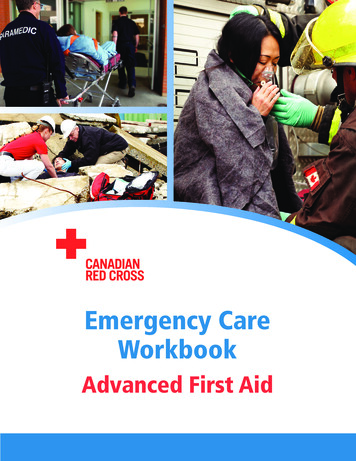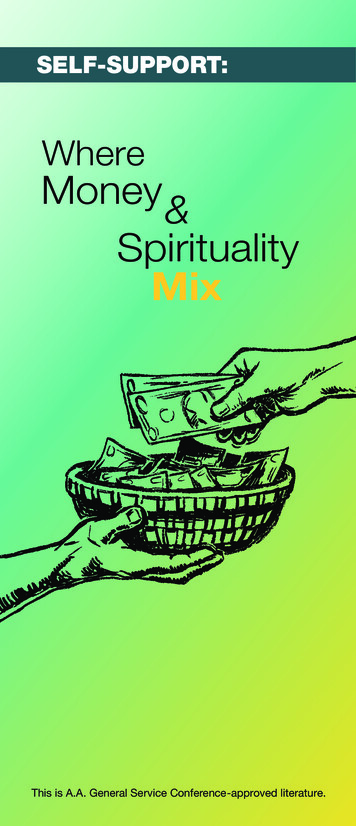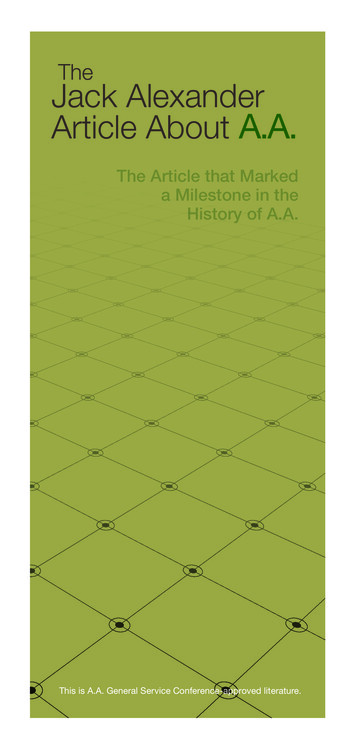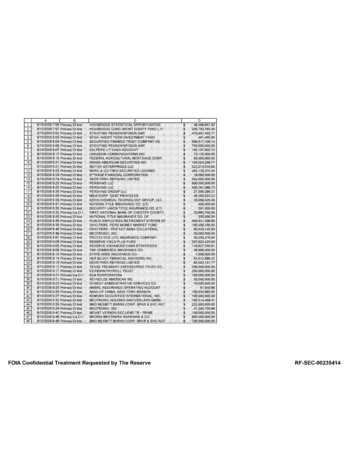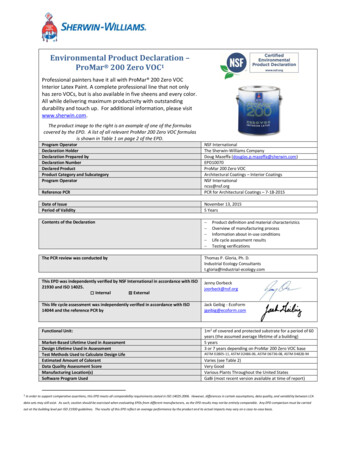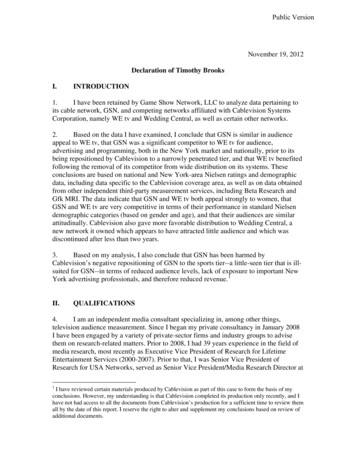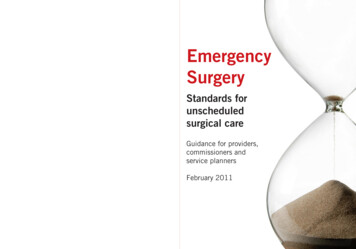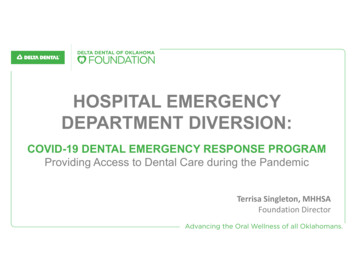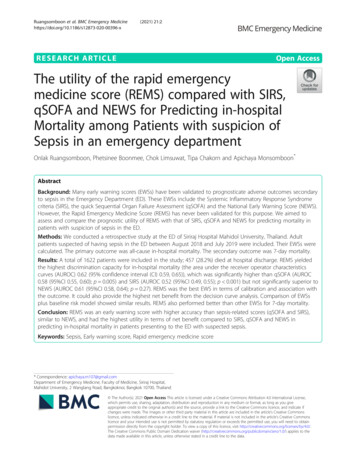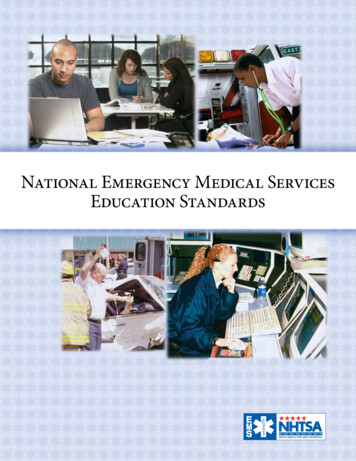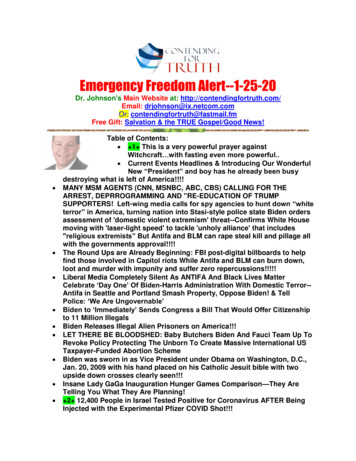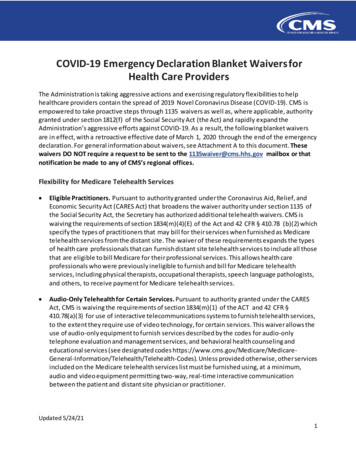
Transcription
COVID-19 Emergency Declaration Blanket Waivers forHealth Care ProvidersThe Administration is taking aggressive actions and exercising regulatory flexibilities to helphealthcare providers contain the spread of 2019 Novel Coronavirus Disease (COVID-19). CMS isempowered to take proactive steps through 1135 waivers as well as, where applicable, authoritygranted under section 1812(f) of the Social Security Act (the Act) and rapidly expand theAdministration’s aggressive efforts against COVID-19. As a result, the following blanket waiversare in effect, with a retroactive effective date of March 1, 2020 through the end of the emergencydeclaration. For general information about waivers, see Attachment A to this document. Thesewaivers DO NOT require a request to be sent to the 1135waiver@cms.hhs.gov mailbox or thatnotification be made to any of CMS’s regional offices.Flexibility for Medicare Telehealth Services Eligible Practitioners. Pursuant to authority granted under the Coronavirus Aid, Relief, andEconomic Security Act (CARES Act) that broadens the waiver authority under section 1135 ofthe Social Security Act, the Secretary has authorized additional telehealth waivers. CMS iswaiving the requirements of section 1834(m)(4)(E) of the Act and 42 CFR § 410.78 (b)(2) whichspecify the types of practitioners that may bill for their services when furnished as Medicaretelehealth services from the distant site. The waiver of these requirements expands the typesof health care professionals that can furnish distant site telehealth services to include all thosethat are eligible to bill Medicare for their professional services. This allows health careprofessionals who were previously ineligible to furnish and bill for Medicare telehealthservices, including physical therapists, occupational therapists, speech language pathologists,and others, to receive payment for Medicare telehealth services. Audio-Only Telehealth for Certain Services. Pursuant to authority granted under the CARESAct, CMS is waiving the requirements of section 1834(m)(1) of the ACT and 42 CFR §410.78(a)(3) for use of interactive telecommunications systems to furnish telehealth services,to the extent they require use of video technology, for certain services. This waiver allows theuse of audio-only equipment to furnish services described by the codes for audio-onlytelephone evaluation and management services, and behavioral health counseling andeducational services (see designated codes mation/Telehealth/Telehealth-Codes). Unless provided otherwise, other servicesincluded on the Medicare telehealth services list must be furnished using, at a minimum,audio and video equipment permitting two-way, real-time interactive communicationbetween the patient and distant site physician or practitioner.Updated 5/24/211
Hospitals, Psychiatric Hospitals, and Critical Access Hospitals (CAHs), including CancerCenters and Long-Term Care Hospitals (LTCHs) Emergency Medical Treatment & Labor Act (EMTALA). CMS is waiving the enforcement ofsection 1867(a) of the Act. This will allow hospitals, psychiatric hospitals, and critical accesshospitals (CAHs) to screen patients at a location offsite from the hospital’s campus to preventthe spread of COVID-19, so long as it is not inconsistent with a state’s emergency preparednessor pandemic plan. Verbal Orders. CMS is waiving the requirements of 42 CFR §482.23, §482.24 and §485.635(d)(3)to provide additional flexibility related to verbal orders where read- back verification isrequired, but authentication may occur later than 48 hours. This will allow more efficienttreatment of patients in surge situations. Specifically, the following requirements are waived:o §482.23(c)(3)(i) - If verbal orders are used for the use of drugs and biologicals (exceptimmunizations), they are to be used infrequently.o §482.24(c)(2) - All orders, including verbal orders, must be dated, timed, andauthenticated promptly by the ordering practitioner or by another practitioner who isresponsible for the care of the patient.o §482.24(c)(3) - Hospitals may use pre-printed and electronic standing orders, ordersets, and protocols for patient orders. This would include all subparts at §482.24(c)(3).o §485.635(d)(3) - Although the regulation requires that medication administration bebased on a written, signed order, this does not preclude the CAH from using verbalorders. A practitioner responsible for the care of the patient must authenticate theorder in writing as soon as possible after the fact. Reporting Requirements. CMS is waiving the requirements at 42 CFR §482.13(g) (1)(i)-(ii),which require that hospitals report patients in an intensive care unit whose death is caused bytheir disease, but who required soft wrist restraints to prevent pulling tubes/IVs, no later thanthe close of business on the next business day. Due to current hospital surge, CMS is waivingthis requirement to ensure that hospitals are focusing on increased patient care demands andincreased patient census, provided any death where the restraint may have contributed is stillreported within standard time limits (i.e., close of business on the next business day followingknowledge of the patient’s death). Patient Rights. CMS is waiving requirements under 42 CFR §482.13 only for hospitals that areconsidered to be impacted by a widespread outbreak of COVID-19. Hospitals that are locatedin a state which has widespread confirmed cases (i.e., 51 or more confirmed cases*) as updatedon the CDC website, CDC States Reporting Cases of COVID-19, updates/cases-in-us.html, would not berequired to meet the following requirements:Updated 5/24/212
o §482.13(d)(2) - With respect to timeframes in providing a copy of a medical record.o §482.13(h) - Related to patient visitation, including the requirement to have writtenpolicies and procedures on visitation of patients who are in COVID-19 isolation andquarantine processes.o §482.13(e)(1)(ii) - Regarding seclusion.*The waiver flexibility is based on the number of confirmed cases as reported by CDC and willbe assessed accordingly when COVID-19 confirmed cases decrease. Sterile Compounding. CMS is waiving requirements (also outlined in USP797) at 42 CFR§482.25(b)(1) and §485.635(a)(3) in order to allow used face masks to be removed andretained in the compounding area to be re-donned and reused during the same work shift inthe compounding area only. This will conserve scarce face mask supplies. CMS will not reviewthe use and storage of face masks under these requirements. Detailed Information Sharing for Discharge Planning for Hospitals and CAHs. CMS is waivingthe requirement 42 CFR §482.43(a)(8), §482.61(e), and §485.642(a)(8) to provide detailedinformation regarding discharge planning, described below:o The hospital, psychiatric hospital, and CAH must assist patients, their families, or thepatient’s representative in selecting a post-acute care provider by using and sharingdata that includes, but is not limited to, home health agency (HHA), skilled nursingfacility (SNF), inpatient rehabilitation facility (IRF), and long-term care hospital (LTCH)quality measures and resource use measures. The hospital must ensure that the postacute care data on quality measures and resource use measures is relevant andapplicable to the patient’s goals of care and treatment preferences.o CMS is maintaining the discharge planning requirements that ensure a patient isdischarged to an appropriate setting with the necessary medical information and goalsof care as described in 42 CFR §482.43(a)(1)-(7) and (b). Limiting Detailed Discharge Planning for Hospitals. CMS is waiving all the requirements andsubparts at 42 CFR §482.43(c) related to post-acute care services so as to expedite the safedischarge and movement of patients among care settings, and to be responsive to fluidsituations in various areas of the country. CMS is maintaining the discharge planningrequirements that ensure a patient is discharged to an appropriate setting with the necessarymedical information and goals of care as described in 42 CFR §482.43(a)(1)-(7) and (b). CMS iswaiving the more detailed requirement that hospitals ensure those patients discharged homeand referred for HHA services, or transferred to a SNF for post-hospital extended care services,or transferred to an IRF or LTCH for specialized hospital services, must:o §482.43(c)(1): Include in the discharge plan a list of HHAs, SNFs, IRFs, or LTCHs that areavailable to the patient.Updated 5/24/213
o §482.43(c)(2): Inform the patient or the patient’s representative of their freedom tochoose among participating Medicare providers and suppliers of post-dischargeservices.o §482.43(c)(3): Identify in the discharge plan any HHA or SNF to which the patient isreferred in which the hospital has a disclosable financial interest, as specified by theSecretary, and any HHA or SNF that has a disclosable financial interest in a hospitalunder Medicare. Medical Staff. CMS is waiving requirements under 42 CFR §482.22(a)(1)-(4) to allow forphysicians whose privileges will expire to continue practicing at the hospital and for newphysicians to be able to practice before full medical staff/governing body review and approvalto address workforce concerns related to COVID-19. CMS is waiving §482.22(a) (1)-(4)regarding details of the credentialing and privileging process. (Please also refer to PractitionerLocations Blanket Waiver listed below.) Medical Records. CMS is waiving requirements under 42 CFR §482.24(a) through (c), whichcover the subjects of the organization and staffing of the medical records department,requirements for the form and content of the medical record, and record retentionrequirements, and these flexibilities may be implemented so long as they are not inconsistentwith a state’s emergency preparedness or pandemic plan. CMS is waiving §482.24(c)(4)(viii)related to medical records to allow flexibility in completion of medical records within 30 daysfollowing discharge from a hospital. This flexibility will allow clinicians to focus on the patientcare at the bedside during the pandemic. Flexibility in Patient Self Determination Act Requirements (Advance Directives). CMS iswaiving the requirements at sections 1902(a)(58) and 1902(w)(1)(A) of the Act (for Medicaid);1852(i) of the Act (for Medicare Advantage); and 1866(f) of the Act and 42 CFR §489.102 (forMedicare), which require hospitals and CAHs to provide information about their advancedirective policies to patients. CMS is waiving this requirement to allow staff to more efficientlydeliver care to a larger number of patients. Physical Environment. CMS is waiving certain physical environment requirements under theMedicare conditions of participation at 42 CFR §482.41 and 42 CFR §485.623 to allow forincreased flexibilities for surge capacity and patient quarantine at hospitals, psychiatrichospitals, and critical access hospitals (CAHs) as a result of COVID-19. CMS will permit facilityand non-facility space that is not normally used for patient care to be utilized for patient careor quarantine, provided the location is approved by the state (ensuring that safety and comfortfor patients and staff are sufficiently addressed) and is consistent with the state’s emergencypreparedness or pandemic plan. This allows for increased capacity and promotes appropriatecohorting of COVID-19 patients. States are still subject to obligations under the integrationmandate of the Americans with Disabilities Act, to avoid subjecting persons with disabilities toUpdated 5/24/214
unjustified institutionalization or segregation 1. Telemedicine. CMS is waiving the provisions related to telemedicine at 42 CFR §482.12(a) (8)–(9) for hospitals and §485.616(c) for CAHs, making it easier for telemedicine services to befurnished to the hospital’s patients through an agreement with an off-site hospital. This allowsfor increased access to necessary care for hospital and CAH patients, including access tospecialty care. Physician Services. CMS is waiving requirements under 42 CFR §482.12(c)(1)–(2) and§482.12(c)(4), which requires that Medicare patients be under the care of a physician. Thiswaiver may be implemented so long as it is not inconsistent with a state’s emergencypreparedness or pandemic plan. This allows hospitals to use other practitioners to the fullestextent possible. Anesthesia Services. CMS is waiving requirements under 42 CFR §482.52(a)(5), §485.639(c) (2),and §416.42 (b)(2) that a certified registered nurse anesthetist (CRNA) is under the supervisionof a physician in paragraphs §482.52(a)(5) and §485.639(c)(2). CRNA supervision will be at thediscretion of the hospital and state law. This waiver applies to hospitals, CAHs, and AmbulatorySurgical Centers (ASCs). These waivers will allow CRNAs to function to the fullest extent of theirlicensure, and may be implemented so long as they are not inconsistent with a state’semergency preparedness or pandemic plan. Utilization Review. CMS is waiving certain requirements under 42 CFR §482.1(a)(3) and 42 CFR§482.30 which address the statutory basis for hospitals and includes the requirement thathospitals participating in Medicare and Medicaid must have a utilization review plan thatmeets specified requirements.o CMS is waiving the entire utilization review condition of participation UtilizationReview (UR) at §482.30, which requires that a hospital must have a UR plan with a URcommittee that provides for a review of services furnished to Medicare and Medicaidbeneficiaries to evaluate the medical necessity of the admission, duration of stay, andservices provided. These flexibilities may be implemented so long as they are notinconsistent with a state’s emergency preparedness or pandemic plan. Removing theseadministrative requirements will allow hospitals to focus more resources on providingdirect patient care. Written Policies and Procedures for Appraisal of Emergencies at Off Campus Hospital1Pleasenote that consistent with the integration mandate of Title II of the ADA and the Olmstead vs LC decision, States areobligated to offer/ provide discharge planning and/or case management/ transition services, as appropriate, to individuals who areremoved from their Medicaid home and community based services under these authorities during the course of the public healthemergency as well as to individuals with disabilities who may require these services in order to avoid unjustified institutionalizationor segregation. Transition services/ case management and/or discharge planning would be provided to facilitate these individualsin their return to the community when their condition and public health circumstances permit.Updated 5/24/215
Departments. CMS is waiving 42 CFR §482.12(f)(3), emergency services, with respect to surgefacilities only, such that written policies and procedures for staff to use when evaluatingemergencies are not required for surge facilities. This removes the burden on facilities todevelop and establish additional policies and procedures at their surge facilities or surge sitesrelated to the assessment, initial treatment, and referral of patients. These flexibilities may beimplemented so long as they are not inconsistent with a state’s emergency preparedness orpandemic plan. Emergency Preparedness Policies and Procedures. CMS is waiving 42 CFR §482.15(b) and§485.625(b), which requires the hospital and CAH to develop and implement emergencypreparedness policies and procedures, and §482.15(c)(1)–(5) and §485.625(c)(1)–(5) whichrequires that the emergency preparedness communication plans for hospitals and CAHs tocontain specified elements with respect to the surge site. The requirement under thecommunication plan requires hospitals and CAHs to have specific contact information for staff,entities providing services under arrangement, patients’ physicians, other hospitals and CAHs,and volunteers. This would not be an expectation for the surge site. This waiver applies to bothhospitals and CAHs, and removes the burden on facilities to establish these policies andprocedures for their surge facilities or surge sites. Quality Assessment and Performance Improvement Program. CMS is waiving 42 CFR§482.21(a)–(d) and (f), and §485.641(a), (b), and (d), which provide details on the scope of theprogram, the incorporation, and setting priorities for the program’s performance improvementactivities, and integrated Quality Assurance & Performance Improvement programs (forhospitals that are part of a hospital system). These flexibilities, which apply to both hospitalsand CAHs, may be implemented so long as they are not inconsistent with a state’s emergencypreparedness or pandemic plan. We expect any improvements to the plan to focus on thePublic Health Emergency (PHE). While this waiver decreases burden associated with thedevelopment of a hospital or CAH QAPI program, the requirement that hospitals and CAHsmaintain an effective, ongoing, hospital-wide, data-driven quality assessment and performanceimprovement program will remain. This waiver applies to both hospitals and CAHs. Nursing Services. CMS is waiving the requirements at 42 CFR §482.23(b)(4), which requires thenursing staff to develop and keep current a nursing care plan for each patient, and§482.23(b)(7), which requires the hospital to have policies and procedures in place establishingwhich outpatient departments are not required to have a registered nurse present. Thesewaivers allow nurses increased time to meet the clinical care needs of each patient and allowfor the provision of nursing care to an increased number of patients. In addition, we expect thathospitals will need relief for the provision of inpatient services and as a result, the requirementto establish nursing-related policies and procedures for outpatient departments is likely oflower priority. These flexibilities apply to both hospitals and CAHs §485.635(d)(4), and may beimplemented so long as they are not inconsistent with a state’s emergency preparedness orUpdated 5/24/216
pandemic plan. Food and Dietetic Services. CMS is waiving the requirement at paragraph 42 CFR §482.28(b) (3),which requires providers to have a current therapeutic diet manual approved by the dietitianand medical staff readily available to all medical, nursing, and food service personnel. Suchmanuals would not need to be maintained at surge capacity sites. These flexibilities may beimplemented so long as they are not inconsistent with a state’s emergency preparedness orpandemic plan. Removing these administrative requirements will allow hospitals to focus moreresources on providing direct patient care. Respiratory Care Services. CMS is waiving the requirements at 42 CFR §482.57(b)(1) thatrequire hospitals to designate in writing the personnel qualified to perform specific respiratorycare procedures and the amount of supervision required for personnel to carry out specificprocedures. These flexibilities may be implemented so long as they are not inconsistent with astate’s emergency preparedness or pandemic plan. Not being required to designate theseprofessionals in writing will allow qualified professionals to operate to the fullest extent oftheir licensure and training in providing patient care. Expanded Ability for Hospitals to Offer Long-term Care Services (“Swing-Beds”) for PatientsWho do not Require Acute Care but do Meet the Skilled Nursing Facility (SNF) Level of CareCriteria as Set Forth at 42 CFR 409.31. Under section 1135(b)(1) of the Act, CMS is waiving therequirements at 42 CFR 482.58, “Special Requirements for hospital providers of long-term careservices (“swing-beds”)” subsections (a)(1)-(4) “Eligibility”, to allow hospitals to establish SNFswing beds payable under the SNF prospective payment system (PPS) to provide additionaloptions for hospitals with patients who no longer require acute care but are unable to findplacement in a SNF.In order to qualify for this waiver, hospitals must:o Not use SNF swing beds for acute level care.o Comply with all other hospital conditions of participation and those SNF provisions setout at 42 CFR 482.58(b) to the extent not waived.o Be consistent with the state’s emergency preparedness or pandemic plan.Hospitals must call the CMS Medicare Administrative Contractor (MAC) enrollment hotline toadd swing bed services. The hospital must attest to CMS that:o They have made a good faith effort to exhaust all other options;o There are no skilled nursing facilities within the hospital’s catchment area that undernormal circumstances would have accepted SNF transfers, but are currently not willingUpdated 5/24/217
to accept or able to take patients because of the COVID-19 public health emergency(PHE);o The hospital meets all waiver eligibility requirements; ando They have a plan to discharge patients as soon as practicable, when a SNF bed becomesavailable, or when the PHE ends, whichever is earlier.This waiver applies to all Medicare enrolled hospitals, except psychiatric and long term carehospitals that need to provide post-hospital SNF level swing-bed services for non-acutecare patients in hospitals, so long as the waiver is not inconsistent with the state’semergency preparedness or pandemic plan. The hospital shall not bill for SNF PPS paymentusing swing beds when patients require acute level care or continued acute care at anytime while this waiver is in effect. This waiver is permissible for swing bed admissionsduring the COVID-19 PHE with an understanding that the hospital must have a plan todischarge swing bed patients as soon as practicable, when a SNF bed becomes available, orwhen the PHE ends, whichever is earlier. Medicare Graduate Medical Education (GME) Affiliation Agreement (updated 5/24/21): Dueto the COVID-19 Public Health Emergency (PHE), under the authority of section 1135(b)(5) ofthe Social Security Act (the Act), CMS is extending the submission deadline for both newMedicare GME affiliation agreements and amendments to existing Medicare GME affiliationagreements to January 1, 2022. CMS previously waived the July 1 submission deadline under42 CFR 413.79(f)(1) for new Medicare GME affiliation agreements and the June 30 deadlineunder the May 12, 1998 Health Care Financing Administration Final Rule (63 FR 26318, 26339,26341) for amendments of existing Medicare GME affiliation agreements. That is, during theCOVID-19 PHE, instead of requiring that new Medicare GME affiliation agreements besubmitted to CMS and the MACs by July 1, 2020 (for the academic year starting July 1, 2020),and that amendments to Medicare GME affiliation agreements be submitted to CMS and theMACs by June 30, 2020 (for the academic year ending June 30, 2020), CMS allowed hospitals tosubmit new and/or amended Medicare GME affiliation agreements as applicable to CMS andthe MACs by January 1, 2021.As a result of the continuation of the COVID-19 PHE effective April 21, 2021, new MedicareGME affiliation agreements must be submitted by January 1, 2022 (for the academic yearstarting July 1, 2021) and amended Medicare GME affiliation agreements must be submitted byJanuary 1, 2022 (for the academic year ending June 30, 2021). As under existing procedures,hospitals should email new and/or amended agreements to CMS atMedicare GME Affiliation Agreement@cms.hhs.gov, and indicate in the subject line whetherthe affiliation agreement is a new one or an amended one.Updated 5/24/218
CAH Personnel Qualifications. CMS is waiving the minimum personnel qualifications for clinicalnurse specialists at paragraph 42 CFR §485.604(a)(2), nurse practitioners at paragraph§485.604(b)(1)–(3), and physician assistants at paragraph §485.604(c)(1)–(3). Removing theseFederal personnel requirements will allow CAHs to employ individuals in these roles who meetstate licensure requirements and provide maximum staffing flexibility. These flexibilities shouldbe implemented so long as they are not inconsistent with a state’s emergency preparedness orpandemic plan. CAH Staff Licensure. CMS is deferring to staff licensure, certification, or registration to statelaw by waiving 42 CFR §485.608(d) regarding the requirement that staff of the CAH be licensed,certified, or registered in accordance with applicable federal, state, and local laws andregulations. This waiver will provide maximum flexibility for CAHs to use all available clinicians.These flexibilities may be implemented so long as they are not inconsistent with a state’semergency preparedness or pandemic plan. CAH Status and Location. CMS is waiving the requirement at 42 CFR §485.610(b) that the CAHbe located in a rural area or an area being treated as being rural, allowing the CAH flexibility inthe establishment of surge site locations. CMS is also waiving the requirement at §485.610(e)regarding the CAH’s off-campus and co-location requirements, allowing the CAH flexibility inestablishing temporary off-site locations. In an effort to facilitate the establishment of CAHswithout walls, these waivers will suspend restrictions on CAHs regarding their rural locationand their location relative to other hospitals and CAHs. These flexibilities may be implementedso long as they are not inconsistent with a state’s emergency preparedness or pandemic plan. CAH Length of Stay. CMS is waiving the requirements that CAHs limit the number of beds to 25,and that the length of stay be limited to 96 hours under the Medicare conditions ofparticipation for number of beds and length of stay at 42 CFR §485.620. Temporary Expansion Locations: For the duration of the PHE related to COVID-19, CMS iswaiving certain requirements under the Medicare conditions of participation at 42 CFR §482.41and §485.623 (as noted elsewhere in this waiver document) and the provider- baseddepartment requirements at §413.65 to allow hospitals to establish and operate as part of thehospital any location meeting those conditions of participation for hospitals that continue toapply during the PHE. This waiver also allows hospitals to change the status of their currentprovider-based department locations to the extent necessary to address the needs of hospitalpatients as part of the state or local pandemic plan. This extends to any entity operating as ahospital (whether a current hospital establishing a new location or an Ambulatory SurgicalCenter (ASC) enrolling as a hospital during the PHE pursuant to a streamlined enrollment andsurvey and certification process) so long as the relevant location meets the conditions ofparticipation and other requirements not waived by CMS. This waiver will enable hospitals tomeet the needs of Medicare beneficiaries.Updated 5/24/219
Responsibilities of Physicians in Critical Access Hospitals (CAHs). 42 CFR § 485.631(b)(2). CMSis waiving the requirement for CAHs that a doctor of medicine or osteopathy be physicallypresent to provide medical direction, consultation, and supervision for the services provided inthe CAH at § 485.631(b)(2). CMS is retaining the regulatory language in the second part of therequirement at § 485.631(b)(2) that a physician be available “through direct radio or telephonecommunication, or electronic communication for consultation, assistance with medicalemergencies, or patient referral.” Retaining this longstanding CMS policy and relatedlongstanding subregulatory guidance that further described communication between CAHs andphysicians will assure an appropriate level of physician direction and supervision for theservices provided by the CAH. This will allow the physician to perform responsibilities remotely,as appropriate. This also allows CAHs to use nurse practitioners and physician assistants to thefullest extent possible, while ensuring necessary consultation and support as needed. Postponement of Application Deadline to the Medicare Geographic Classification ReviewBoard (New since 7/29 Release). Per requirements at section 1886(d)(10)(C)(ii) of the SocialSecurity Act (the Act) and 42 CFR 412.256(a)(2), September 1, 2020 is the deadline to submit anapplication to the Medicare Geographic Classification Review Board (MGCRB) for FY 2022reclassifications. These provisions require applications to be filed through OH Review-Boards/MGCRB/Electronic-Filing)not later than the first day of the 13-month period preceding the Federal fiscal year for whichreclassification is requested.Due to the COVID-19 Public Health Emergency (PHE), under the authority of section 1135(b)(5)of the Act, CMS is postponing the September 1 deadline until 15 days after the public displaydate of the FY 2021 IPPS/LTCH final rule by the Office of the Federal Register. Long Term Care Hospitals - Site Neutral Payment Rate Provisions. Also as required by section3711(b) of the CARES Act, during the Public Health Emergency (PHE) due to COVID-19, theSecretary has waived section 1886(m)(6) of the Social Security Act relating to certain siteneutral payment rate provisions for long-term care hospitals (LTCHs).o Section 3711(b)(1) of the CARES Act waives the payment adjustment under section1886(m)(6)(C)(ii) of the Act for LTCHs that do not have a discharge payment percentage(DPP) for the period that is at least 50 percent during the COVID-19 public healthemergency period. Under this provision, for the purposes of calculating an LTCH’s DPP,all admissions during the COVID-19 public health emergency period will be counted inthe numerator of the calculation, that is, LTCH cases that were admitted during theCOVID-19 public health emergency period will be counted as discharges paid the LTCHPPS standard Federal payment rate.o Section 3711(b)(2) of the CARES Act provides a waiver of the application of the siteneutral payment rate under section 1886(m)(6)(A)(i) of the Act for those LTCHadmissions that are in response to the public
notification be made to any of CMS’s regional offices. Flexibility for Medicare Telehealth Services Eligible Practitioners. Pursuant to authority granted under the Coronavirus Aid, Relief, and Economic Security Act (CARES Act)

